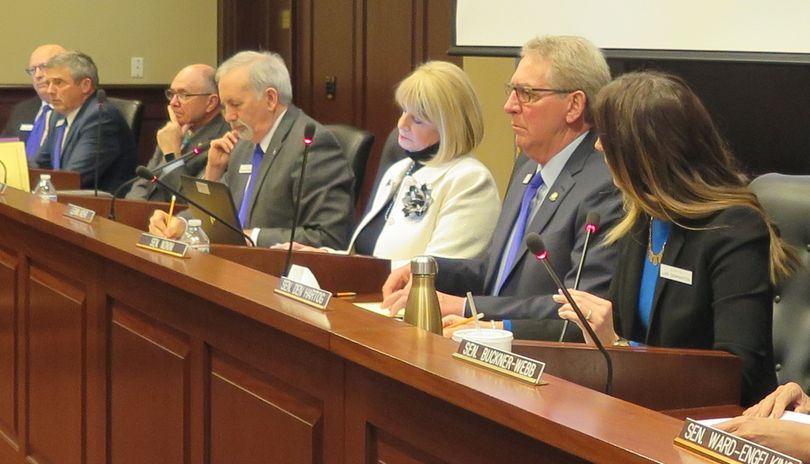School science standards approved - will take effect in full as submitted

The Senate Education Committee has voted 6-3 to approve proposed revised school science standards as-is – and not delete any parts. Because both houses haven’t agreed to reject parts of the new standards, the Senate panel’s decision stands – the rules will take effect as proposed. You can read my full story here at spokesman.com.
Sen. Janie Ward-Engelking, D-Boise, a retired teacher, made the successful substitute motion to approve the standards as submitted; Sen. Chuck Winder, R-Boise, seconded it. Here’s how the vote broke down:
Voting yes: Sens. Winder, Nonini, Guthrie, Crabtree, Buckner-Webb, and Ward-Engelking.
Voting no: Sens. Thayn, DenHartog, and Mortimer.
DenHartog offered the first motion – to approve all the standards, but delete all the supporting content. The House Education Committee voted to remove one of the standards and all the supporting content. Mortimer seconded her motion. But because Ward-Engelking’s motion passed, DenHartog’s wasn’t voted on.
Last year, the House Education Committee voted to remove five sections of the standards dealing with climate change; the Senate panel reluctantly went along, as at that point in the administrative rules process, if they didn't agree, no new standards would have been approved and the state would have reverted to outdated, 2001-era science standards. Last year, the standards were proposed as a temporary rule; this year, they're a pending rule, which means if both houses don't agree to block all or part of them, they become permanent.
After the vote, Sen. Education Chairman Dean Mortimer, R-Idaho Falls, said, “Thank you, committee – the republican process works well still, voices heard, I believe, on both sides.” Sen. Cherie Buckner-Webb, D-Boise, interrupted, asking if she’d heard him correctly. Mortimer repeated “the republican process,” then corrected himself, saying, “The process of a republic.”
“Thank you, chairman, thank you,” Buckner-Webb said.
Amid laughter, Mortimer said, “Thank you, and I have no problem with distinction.”
Sen. Carl Crabtree, R-Grangeville, a rancher and first-term senator, spoke out for the first time on the standards. “I haven’t been here that long, but this science standards conversation has been going on since I got here,” he said. “So I try to look at things in a fairly simple way, because I’m a fairly simple guy.”
“We had a problem," he said. "We needed some direction on science standards, right? So if I have a sick cow,I call a vet, I call a specialist. We called some specialists, science teachers. We asked them what they thought, they gave us some recommendations.. ... We ran it by the public, much as I would run it by my neighbors on the cow problem. ... We did that, we ran it by the public, the public that actually elected us to sit here."
"So we take those results. So we brought the results to the Legislature, the Legislature had some conversations about it, didn’t like it so much. So we sent it back through the process. We went to the specialists, we went back to the public, and now we’re back to the Legislature.”
“That process, folks, in my view is kind of the American process of success,” Crabtree said. “And if we don’t believe in that process, then we probably don’t like the product. I believe in the process. Thank you.”
DenHartog said, “I don’t see any problems with the information that is in the supporting content,” though her motion proposed to delete all of it. “My concern is that I do not believe it is the role of the Legislature and the state as a whole to be approving and putting in rule supporting content. I do believe the department should have that information and should make it available to local districts and to educators so they can use it as they see fit in their classrooms and in their schools.” She said, “In no way is my motion dismissive of the work that the educators put into developing the supporting content. I believe it plays an important role. I believe it is good content. But once we put it in rule I think it sets a dangerous precedence for what our role as legislators is. We had a lot of talk about science being inquiry based and dynamic. As soon as we put this in rule it becomes a lot less dynamic. I think we start hemming people in where we don’t need to.”
Several committee members had questions for Dennis Stevenson, the state’s administrative rules director. He told the senators, “They seem to be, as written, a very integral part to that document.” He said the Senate panel was free to make whatever decision it wished, and wasn’t constrained by what the House panel did. He explained that if the two houses disagree, the rules would take effect as presented.
Ward-Engelking said, “I think it’s important to recognize that this content, not only the standards but the content, was written by our elite science teachers here in Idaho. It’s been well vetted, we’ve had public hearings on this information, and as a former teacher I know how important the standards and content are to beginning teachers. It’s where we go to find the information that is absolutely the minimum of what we need to use in our classrooms, to prep them for any kind of test they’re going to be taking, any kind of end-of-course work, any kind of statewide tests. … These are the professionals of our field writing these standards and content, and it’s very important that we adopt them in their entirety.”
At earlier public hearings on the standards, 100 percent of those testifying – including teachers, students, parents, scientists, professors, business leaders and others from throughout the state – supported adopting the standards in full, as-is.
